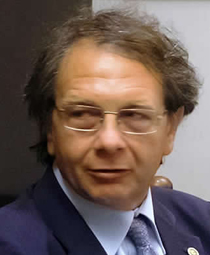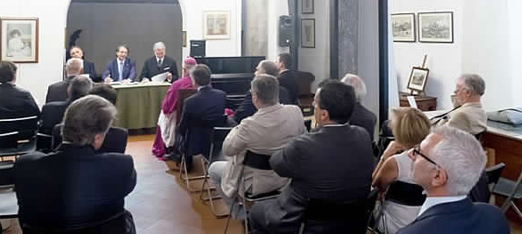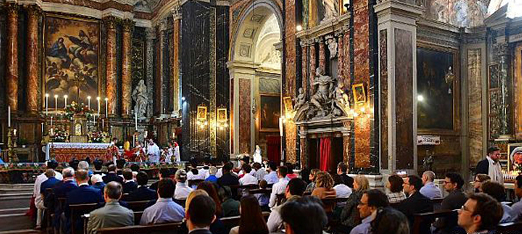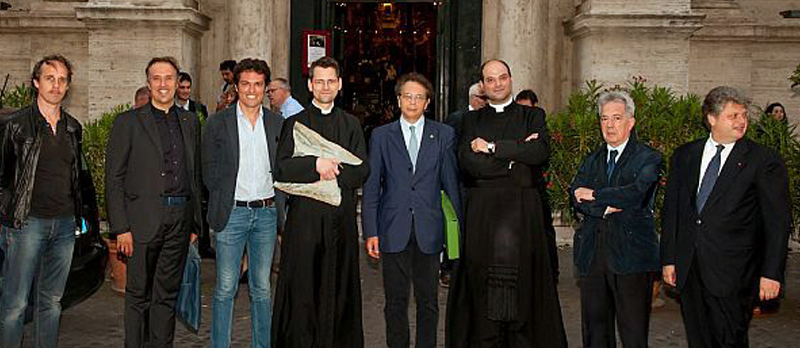In this interview Fabio Marino presents the Una Voce Italia association, founding organization of the annual Roman pilgrimage organized by CISP (Coetus Internationalis Summorum Pontificum) for the promotion of the traditional Catholic liturgy in the Church. The Pilgrimage "Populus Summorum Pontificum" is fruit of the work of the Coetus Internationalis, which includes 12 associations working together to ensure that everything goes well during the Roman pilgrimage. The Coetus is open to all associations that may wish to contribute to the promotion and the development of this initiative.
Can you introduce Una Voce Italy?
 Una Voce Italy is an association which aims at the safeguarding of the Gregorian Latin liturgy. It was founded in Rome on 7 July 1966, within the framework of the Una Voce movement, which had seen the birth of similar associations in France and abroad.
Una Voce Italy is an association which aims at the safeguarding of the Gregorian Latin liturgy. It was founded in Rome on 7 July 1966, within the framework of the Una Voce movement, which had seen the birth of similar associations in France and abroad.
The foundation was inspired, promoted and supported by the poetess Cristina Campo (Vittoria Guerrini) who claimed the greatness of the Italian spirit in the face of the civil, moral and religious decadence of the 20th century.
Duke Filippo Caffarelli, the first President of the Association, participated in the foundation of the Foederatio Internationalis Una Voce (FIUV), formalised in 1967.
Sections of the Roman association were soon established in some of Italy's major cities.
The object of Una Voce Italy, according to article 1 of the statutes, is "to defend traditional the language and music in the liturgy of the Roman Church and outside it in full respect of the liturgical and conciliar constitutions".
After the liturgical reform that led to the Ordo Missae of Paul VI, the aim of defending "the Latin-Gregorian liturgical tradition of the Catholic Church" became clearer, thus promoting the use of the missal and all the ancient liturgical books, sacred music and all other traditional liturgical forms and elements (article 3 of the current statutes).
The Association has always affirmed that Catholics can celebrate and participate in the Mass and in the traditional liturgy, and has promoted and organised the celebration of the Tridentine Mass as far as possible. It has also coordinated in the Italian dioceses the request for the application of the indult of St. John Paul II of 1984 and the Motu proprio Ecclesia Dei of 1988, besides endeavouring to promote in general the effective application of the Motu proprio Summorum Pontificum of 2007 of Benedict XVI. Today, it continues to support the right to the Tridentine Mass after the Motu proprio Traditionis Custodes of Pope Francis.
Una Voce Italy has been publishing a newsletter since 1970 interrumptedly, to inform its members and all those interested in the Tridentine Mass about the possibility of participating in it and about the initiatives of the Una Voce movement for its protection and promotion. In May 2022, a special issue of the newsletter was published in order to mark the fiftieth anniversary of Una Voce Notiziario.
Why are you attached to the traditional liturgy?

The traditional Roman liturgy guarantees full fidelity to Catholic doctrine, in particular to the Eucharistic doctrine reaffirmed by the Council of Trent, because the law of prayer is the foundation of the law of faith. This liturgy has belonged and belongs to the religious and spiritual experience of millions of people. What has been held sacred for generations cannot be totally prohibited or considered harmful (Benedict XVI).
Moreover, the traditional Roman Mass belongs to the universal culture as much as it belongs to the Church and the faithful: one would be facing an enormous responsibility towards the history of the human spirit if this traditional Roman Mass were not allowed to live on, although other liturgical forms may exist alongside it.
Why are you a member of CISP?

In July 2012, Una Voce Italy was invited to participate and host a meeting in Rome to organise an international pilgrimage with the celebration of the Tridentine Mass in St Peter's Basilica in the Vatican.
The meeting took place in a room made available by Una Voce Italy near its headquarters.
On that occasion, it was decided to organise the pilgrimage to St Peter's in November of that year and to found an international committee that would continue to organise it in the following years as well. This committee is the Coetus Internationalis Summorum Pontificum (CISP).
Una Voce Italy has considered and considers it very important that the Tridentine Mass be celebrated every year in St. Peter's to allow pilgrims from all over the world to come on pilgrimage to the centre of Christianity and enjoy the traditional liturgy.
This pilgrimage ad Petri Sedem is ideally linked to the pilgrimage of SS. Peter and Paul, which was held in Rome on 28 and 29 June 1970 with the participation of thousands of Catholics from various countries in Europe and the world (http://www.unavoceitalia.org/wordpress/wp-content/uploads/2022/04/uvn76-79ns.pdf, pp. 4 ss.).
At that time, pilgrims were not allowed to enter St. Peter's Basilica to attend the Tridentine Mass or even to pray; they then participated massively in a night vigil in the Piazza, and Mass was celebrated in the Colosseum.
In subsequent years, other traditional international pilgrimages to Rome have taken place at Pentecost.
What is your view on the current state of affairs in the Church with regard to the traditional Mass?
We consider it our primary and essential task, even as a member of the FIUV, to continue to work for the celebration of the Tridentine Mass in all circumstances, even in the face of prohibitions and persecution.
The demand that the Tridentine rite no longer be admitted, which manifested itself most virulently in the years immediately following the 1970 reform, has historically proved to be a losing one.
Source: https://it.summorum-pontificum.org/
Back to the news


 OTHER
OTHER